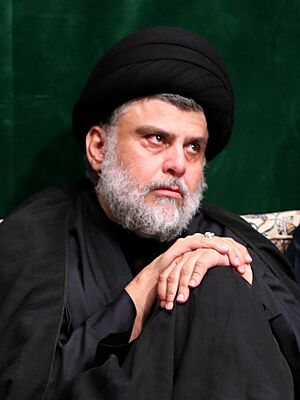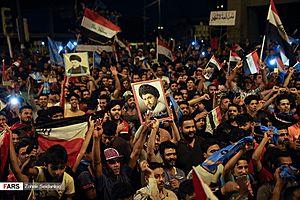Muqtada al-Sadr facts for kids
Quick facts for kids
Muqtada al-Sadr
|
|
|---|---|
|
مقتدى الصدر
|
|

Al-Sadr in Tehran, 2019
|
|
| Leader of the Sadrist Movement | |
| Assumed office 5 December 2003 |
|
| Preceded by | Mohammad al-Sadr |
| Personal details | |
| Born | 4 August 1974 Najaf, Ba'athist Iraq |
| Political party | Sadrist Movement |
| Other political affiliations |
Al-Ahrar Bloc (2014–2018) Alliance Towards Reforms (Saairun)(2018–2021) |
| Residences | Hanana, Najaf, Iraq |
Muqtada al-Sadr (born 4 August 1974) is an Iraqi religious leader, politician, and former leader of a military group. He is a very important Shia Muslim figure. He took over the Sadrist Movement from his father. In 2003, he started a group called the Mahdi Army, which resisted the American presence in Iraq.
After the Mahdi Army was dissolved, he started another group called the Promised Day Brigade. Both groups received support from Iran. In 2014, he created the Peace Companies militia, which he still leads today. In 2018, his political party joined the Saairun alliance. This alliance won the most seats in the Iraqi elections in 2018 and 2021.
Contents
Who is Muqtada al-Sadr?
Muqtada al-Sadr comes from the well-known al-Sadr family. This family originally came from Jabal Amel in Lebanon and later settled in Najaf, Iraq. Muqtada al-Sadr is the son of Muhammad al-Sadr, who was a respected religious and political leader in Iraq. His father stood up against the government of Saddam Hussein. Muqtada al-Sadr is also the nephew of Mohammad Baqir al-Sadr. People often call him Sayyid, which is an honorific title for descendants of the Islamic prophet Muhammad.
His Family Background
Muqtada al-Sadr is the fourth son of the famous Iraqi Shia religious leader, Grand Ayatollah Muhammad al-Sadr. He is also the son-in-law of Grand Ayatollah Muhammad Baqir al-Sadr. Both his father and father-in-law were admired for caring deeply about poor people.
Muqtada al-Sadr is an Iraqi citizen. His great-grandfather was Ismail as-Sadr. Muqtada al-Sadr's father, Mohammed Sadeq al-Sadr, was a highly respected figure in the Shia Islamic world. He and two of his sons died during the time of Saddam Hussein's government. Muqtada's father-in-law was executed by Iraqi authorities in 1980. Muqtada is also a cousin of Musa al-Sadr, who founded the popular Amal Movement in Lebanon.
In 1994, Sadr married one of Muhammad Baqir al-Sadr's daughters.
His Political Views
Muqtada al-Sadr became very popular in Iraq after the government of Saddam Hussein was overthrown by the US invasion in 2003. Sadr has sometimes said that he wants to create an "Islamic democracy" in Iraq.
He has strong support, especially in the Sadr City area of Baghdad. This area was once called Saddam City but was renamed after his father. After Saddam's government fell in 2003, Muqtada al-Sadr organized many of his supporters into a political movement. This movement included a military group called the Jaysh al-Mahdi, or Mahdi Army. This name refers to the Mahdi, a religious figure who Shia Muslims believe will return in the future. This group sometimes had conflicts with the United States and other international forces. The larger Sadrist movement also set up its own religious courts and provided social services in areas they controlled. Many people in Western media called Muqtada al-Sadr an "anti-American" or "radical" religious leader.
His strongest support came from poor Shia people, like those in the Sadr City area of Baghdad. Many Iraqis who supported him saw him as a symbol of resistance against foreign forces.
In February 2014, Sadr announced that he was stepping away from politics and closing down his party's structure. However, later in 2014, he asked for the creation of "Peace Companies" to protect Shia holy places from the Islamic State of Iraq and the Levant. These Peace Companies marched in Sadr City in June. Besides guarding shrines, they also took part in military actions, like helping to retake Jurf al-Nasr in October 2014.
Sadr is seen by many as a populist leader, meaning he appeals to ordinary people. In 2015, he formed an alliance with the Iraqi Communist Party and other non-religious groups. This alliance focused on issues like security and fighting corruption, which are big problems in Iraq. In March 2015, Sadr spoke out against the Saudi Arabian-led intervention in Yemen, saying it went against Islamic-Arabic unity.
On 26 February 2016, Sadr led a huge protest in Baghdad's Tahrir Square. About one million people joined to protest corruption and the government's failure to make changes. Sadr encouraged the protesters to "Raise your voice and shout so the corrupt get scared of you." On 18 March, his followers started a sit-in protest outside the Green Zone, a highly protected area in Baghdad where government offices and embassies are located. He called the Green Zone "a place that supports corruption." On 27 March, he walked into the Green Zone himself to join the sit-in, telling his followers to stay outside and remain peaceful.
In July 2017, Sadr visited Saudi Arabia and met with Crown Prince Mohammad bin Salman. In April 2018, Sadr said he was ready to help resolve issues between Iran and Saudi Arabia for the good of Iraq and the region.
In May 2018, Sadr's Sairoon electoral list won 54 seats in the Iraqi parliamentary election. This was the first election since the Islamic State was defeated in Iraq. He did not want the U.S. to interfere in forming the new Iraqi government, saying, "The U.S. is an invader country; we do not allow it to interfere" in Iraqi affairs. Sadr has changed his political approach over time. He now presents himself as an Iraqi nationalist. His new party, Istiqāmah ("Integrity"), has allied with different groups, including communists, Sunnis, and non-religious people. He has criticized corruption and Iran's influence in Iraq.
On 7 December 2019, an armed drone attacked Sadr's home in Baghdad. Sadr was not in the country at the time, so there was little damage and no one was hurt.
After the killing of Qasem Soleimani in January 2020 and the Iraqi parliament's decision to ask US troops to leave, Sadr called for the security agreement with the US to be cancelled. He also asked for the US embassy to be closed and US troops to leave Iraq. However, after Iran launched rocket attacks on US military bases on 8 January 2020, Sadr told his followers not to attack US forces in Iraq.
On 25 December 2020, Sadr warned Iran and the United States not to involve Iraq in their conflict.
Recent Activities
On 13 June 2022, 73 members of parliament from Sadr’s group resigned from the parliament during a political crisis in Iraq.
On August 29, 2022, Sadr announced that he was retiring from Iraqi politics. He also said that most of his offices and organizations would be closed.
In May 2024, Sadr called for the US embassy in Baghdad to be closed. This call came after Israeli airstrikes on the Tel al-Sultan refugee camp in Gaza.
On 5 December 2024, Sadr posted a message on Twitter. He urged "Iraq's government, people, parties, militias and security forces" not to get involved in Syria. This was because government forces in Syria were collapsing due to a rebel offensive that started in late November.
Images for kids
-
Al-Sadr in Tehran, 2019
See also
 In Spanish: Muqtada al-Sadr para niños
In Spanish: Muqtada al-Sadr para niños
 | Valerie Thomas |
 | Frederick McKinley Jones |
 | George Edward Alcorn Jr. |
 | Thomas Mensah |




